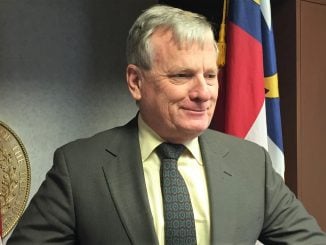RALEIGH — Four local governments have been designated as distressed by criteria created by two North Carolina agencies working in concert— the State Water Infrastructure Authority (SWIA) and North Carolina Local Government Commission (LGC). SWIA is housed within the N.C. Dept. of Environmental Quality, and LGC is housed under the Office of the State Treasurer. The LCG is chaired by Treasurer Dale Folwell.
In a joint effort, the LGC and SWIA developed the assessment process and criteria used to identify distressed government units. SWIA members adopted the distressed unit criteria and approved the four designees at a meeting in late November.
“These are not the only local government units that are experiencing serious problems with their water and wastewater systems and finances,” Folwell said. “This action allows us to assess their condition and make decisions on what needs to be done in the best interest of taxpayers, ratepayers, business and industry, as well as the local governments themselves.”
The four local government units designated as distressed are Eureka (Wayne County), Bethel (Pitt County), Kingstown (Cleveland County), and the Cliffside Sanitary District (Rutherford County).
“Statewide, we have an estimated $17-26 billion dollars in water infrastructure needs, and local systems face big challenges in today’s economy,” Kim Colson, chair of the infrastructure authority and director of the Division of Water Infrastructure, said in a statement. “These strong actions allow for solutions that can be applied right away in the systems that need it most.”
The identified towns are the first in the state to receive the distressed classification under new criteria developed to implement Viable Utility Reserve legislation introduced in Session Law 2020-79. The law establishes a $9 million “Viable Utility Fund within the Department of Environmental Quality, to be used for assisting public water and wastewater systems to become self-sustaining.”
The Viable Utility Fund can be used to address deficiencies in utility systems, and grants may be approved by the LGC to study potential mergers and regionalization of services.
Each of the four distressed towns will receive funds between $100,000 and $400,000 to assess and study their current infrastructure issues and find sustainable long-term solutions.
“We’re not interested in Band-Aids,” said Folwell. “We are looking for healing and permanent solutions for these stressed areas.”
Folwell said the situation has been evolving for the last 20 years but that COVID has exacerbated the situation due to the reduction in money to fund public works.
Eureka was in financial troubles for years leading up to being designated as distressed. In June of 2019, the LGC took control of the town’s finances due to failing to pay water treatment bills to a neighboring township. The failure of payment could have a ripple or domino effect on connected areas.
When the LGC took over Eureka’s affairs in 2019, the water and sewer systems in upwards of 90 municipalities were struggling financially and many indicated infrastructure issues. One of the goals of the LGC is to assess and assist aging water and sewer systems in rural areas. These aging systems have pushed some rural communities close to bankruptcy in the past, and pandemic orders related to utility payments from the governor have exacerbated the problem.
In September, Gov. Roy Cooper announced the release of $175 million to help North Carolinians pay rent and utilities bills that have mounted due to the pandemic and subsequent shutdowns. That release of funds follows August bankruptcy warnings by some utility providers. The warnings of bankruptcy and insolvency were attributed to unpaid bills that were allowed to accumulate under two of the governor’s COVID-19-related executive orders. The NC Utilities Commission reported millions in arrearages for residential and business accounts, and delinquency rates between 30%-50% had been reported in rural towns.
“This is not the end of anything. It’s just the beginning,” Folwell said, adding that “There’s nothing more fundamental or critical, either for individuals or industry, than to have clean, accessible, affordable water and sewer.”


